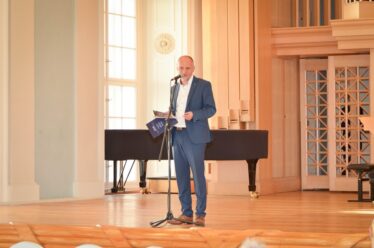Since January, The Terezín Composers´ Institute has had a new director, professor Lubomír Spurný. He gave us a short interview.
What is your relationship to the music of Terezín composers?
At first, I was gazing upon them from afar. I was engaged with other composers, primarily Vítězslav Novák and Alois Hába. I was always focusing on music theory and performance practice. Until recently I have devoted myself to the activities of associations and musical life. Currently, I begin to fill the mosaic with other names.
For example, Jeanette Schenker died in Terezín in 1945. She was the wife of one of the most prominent music theorists of the past century, Heinrich Schenker. Viktor Ullmann, Gideon Klein, Karel Ančerl, Karel Reiner, Robert Brock, Sigmund Schul, and Hans Winterberg all studied and were friends with Alois Hába. Erwin Schulhoff, a distinguished 20th-century composer of most complex music, organized with Hába concerts for promoting the quarter-tone piano. These composers would meet at concerts of German and Czech musical associations. They were all looking for fulfilment and found it in their collaboration. For me, talking about Terezín composers means placing them in the context of interwar central European musical sphere. We should not close them in a new ghetto and surround them with a false aura of exclusivity and untouchability.
With which organizations are you collaborating?
Chiefly, collaboration is with the Terezín Memorial and the Jewish Museum in Prague. We are collaborating globally with Hans Krása Stiftung, the Terezín Music Foundation, the Schächter Institute (Defiant Requiem Foundation), the University of Haifa, and the University of Potsdam. We liaise with chambers of commerce, embassies, and other international institutions.
What does the legacy of Terezín composers offer society?
Ghetto Theresienstadt was the last sinking island of German/Czech/Jewish musical synergy and cooperation, which before the rise of Nazism and race laws had been developing not only in Prague, but in many other places in Europe. Study, acknowledge, develop, and never forget: this is highly relevant today
How will you curate the works of the Terezín composers and what do you have on tap for the near future?
Together with the publisher Bärenreiter Prague we decided to prepare sheet music editions. We were led to this decision by the realization that the music of Terezín composers has been experiencing in recent years a boom in interest from performers both at home and abroad, yet the level of performance often leaves space for desire. The first compositions that will be edited are selected chamber works of Pavel Haas. Soon after, Gideon Klein and Hans Krása should follow. We are also preparing editions of lesser-known composers. In addition to Czech musicologists, well-known foreign musicologists will undertake editing of these works. With a colleague, I am preparing an English edition of Pavel Haas‘ work catalogue with critical commentary. This work will be accompanied by several scholarly studies. All of these should lead to the preparation of a monography about the composer. Understandably, Haas should not remain alone. Initiating publications is an important goal of our “Academy.”
The Academy and Terezín composers?
Yes. Perhaps it sounds strange. This is only a working title for the time being. The title points to one of the areas of our activities. The “Academy” should offer consulting services for applying for grants. It organizes scholarly and public lectures (in Terezín, Prague, and Brno) and conferences, it offers an exchange program, it establishes contacts between universities. Whether this model will work is still to be examined. I myself have been trying to verify this since spring. So far, it seems that among my international colleagues there is relatively high interest in this sort of collaboration.
Of course, I would not like to see the endeavour remaining merely a scholarly project. Our activities should also provide a benefit to the town. Therefore, presently we are in discussions with Mayor Rožcová and the Litoměřice Primary School for Art regarding the possibility of opening several classes of a music school. It will probably be part of our work for the next year or two. We must have at our disposal not only instruments that pupils are interested to play, but also purchase sheet music and find an appropriate form of supporting teachers.
What do you enjoy about the work?
For me it is the interesting nexus between scholarly musicology and organizational work. It is a challenge. In musicology, there usually is no quick response to the work you do. Of course, this can have its pitfalls as well, because even poorly done work can be immediately seen. Last but not least, I enjoy collaborating with friendly colleagues and with people from the sphere of our Institute and the Everlasting Hope Foundation.
Who finances the activities of the Institute?
Primary financing into the future will be from member fees. In any case, the chief source of funds is currently gifts from people and legal entities as well as donations from national and European institutions.
How can people, organizations, and national institutions support your activities?
By actively participating in our events. We value each guest, each listener, each lecturer, each participant. And of course, you may support us either by donating books, art works, or recordings or support us financially and become a member.
Newsletter no. 1 (pdf, 430 kB)

